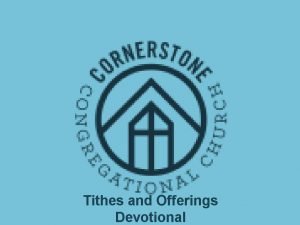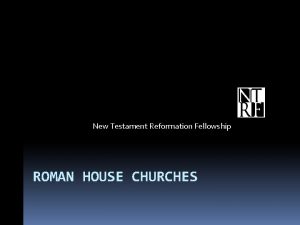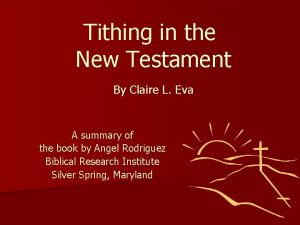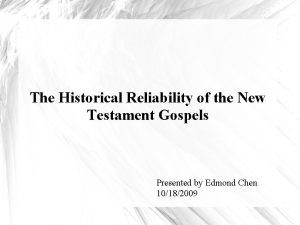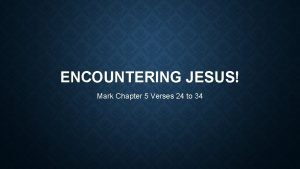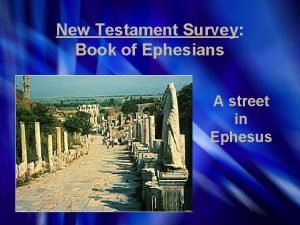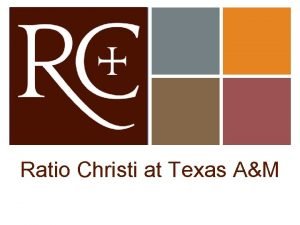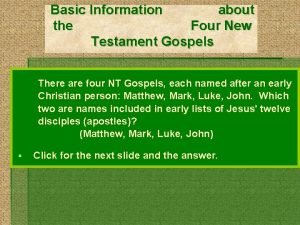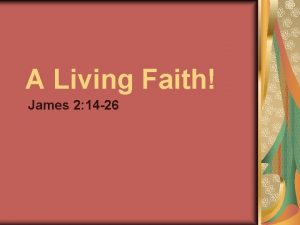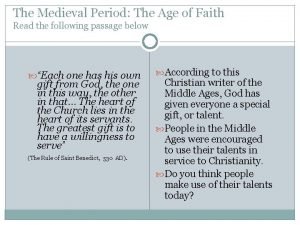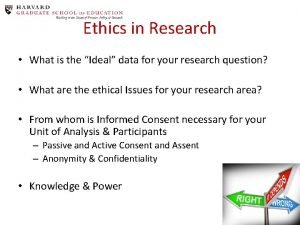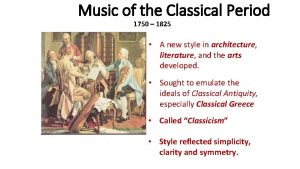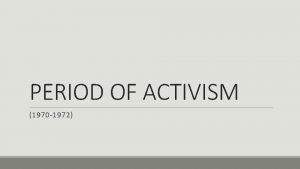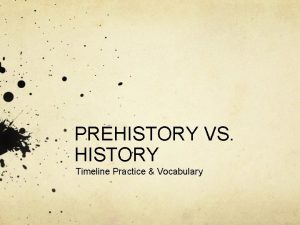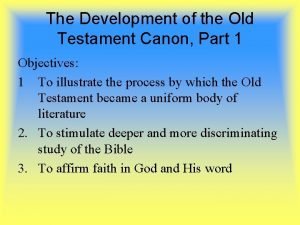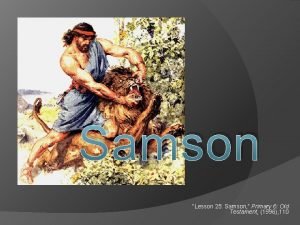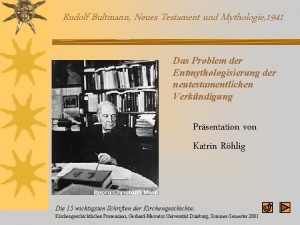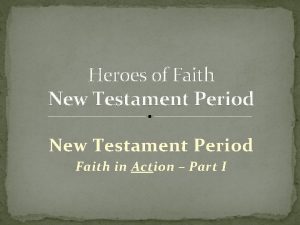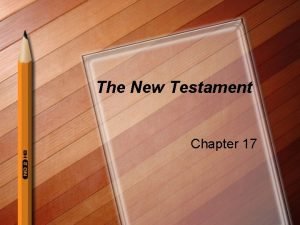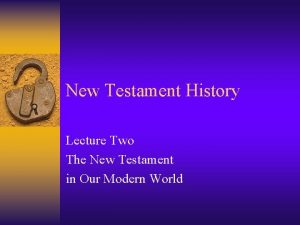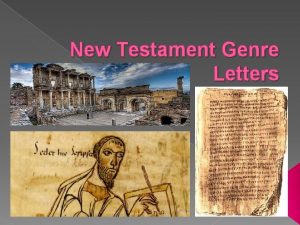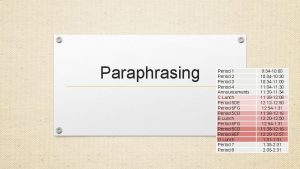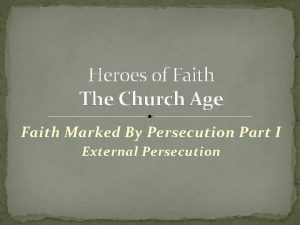Heroes of Faith New Testament Period Faith in






































- Slides: 38

Heroes of Faith New Testament Period Faith in Action – Part III Several Other Key Leaders

Introduction: 1. In our previous lessons we tracked the activities of the twelve apostles who preached the Gospel in Jerusalem, Judea, Samaria, and to the uttermost parts of the earth. 2. We also explored the immense efforts of the apostle Paul who diligently proclaimed the truth about Jesus Christ to his fellow Jews and he was also instrumental in one of the largest missionary endeavors to preach the Gospel to the Gentiles. 3. These missionary activities take place during the first century and are recorded in the book of Acts and the various letters written by the apostles and others.

Introduction: 4. The church (toward the end of the 1 st century) expanded throughout the known world of that era and several key cities became central hubs of Christianity: � Jerusalem � Ephesus � Antioch � Rome � Alexandria in Egypt 5. In this lesson we will look at a number of other key leaders who work alongside the apostles as the church expanded in these cities during the 1 st century.

Mark (also known as John Mark) 1. Background information � He was a Jewish Christian � He lived in Jerusalem with his mother Mary during the early days of the church Ø Their home was used as a Christian meeting place (Acts 12: 12) Ø There is no information about who his father was

Mark (also known as John Mark) 1. Background information � He was a close friend of the apostle Peter (I Peter 5: 13) Ø In the early days of the church in Jerusalem (33 -47 AD), it is believed that Mark became familiar with Peter and his preaching. Ø This close relationship with Peter is probably what led to the gospel account dictated by Peter to Mark which became our earliest record of the life of Jesus Christ – The Gospel according to Mark. The date the gospel was actually written is unknown but it is believed to have been written prior to A. D. 70

Mark (also known as John Mark) 2. At a later point, Mark will travel to Antioch and accompany Paul and Barnabas on their first missionary journey. (Acts 12: 25, Acts 13: 5) � For some unstated reason, Mark travels as far as Perga in Pamphylia (modern day southwestern coast of Turkey) and then leaves and returns to Jerusalem. This created some problems between Mark and Paul for a season of time. � Mark was not welcome to travel with Paul and Barnabas on their second missionary journey. (Acts 15: 36 -38)

Mark (also known as John Mark) �Mark, a cousin to Barnabas (Colossians 4: 10) will minister alongside him at a later point on the Island of Cyprus (Acts 15: 39). The date for this is approximately A. D. 51 �Luke makes no further mention of Mark, Barnabas or Peter in the book of Acts after the events recorded in Acts 15.

Mark (also known as John Mark) 3. After ministering on the Island of Cyprus with Barnabas we lose track of Mark until he travels to Rome (approx. A. D. 57). 4. Mark will minister while in Rome and eventually reconnect with the Apostle Paul during Paul’s first imprisonment, somewhere between the years A. D. 60 -62. (Colossians 4: 10, Philemon 23 -24) 5. After Paul is release from his first imprisonment (house arrest), Mark will remain in Rome and connect with Peter and serve with him there for a season. (I Peter 5: 13)

Mark (also known as John Mark) 6. It appears that Mark will leave Rome for a season, probably due to the martyrdom of Peter and the persecution that the Emperor Nero was inflicting on Christians. 7. It is presumed that Mark heads somewhere in Asia Minor and then He will return to Rome again at Paul’s request to assist him during Paul’s second and final imprisonment. Apparently Timothy was to pick him up on his way from Ephesus to Rome. (II Timothy 4: 11) 8. Paul is martyred by Emperor Nero not long after Peter was killed (A. D. 67)

Mark (also known as John Mark) 9. The Coptic Orthodox Church of Alexandria Egypt lays claim to Mark in his final years. � It is believed that Peter appointed Mark as a bishop and sent him off to Egypt. Ø Egypt was known for its pagan idolatry Ø The principle city of Egypt at the time of Mark was called Alexandria Ø There was a sizeable Jewish community there and it was in the city of Alexandria where the Hebrew Old Testament was translated into Greek.

Mark (also known as John Mark) �There a number of unique stories and traditions taught by the Coptic Church about Mark but the best description about his contribution to Christianity was his apparent passion to evangelize or lead people to faith in Christ. Ø The claims to him being an evangelist are pretty consistent with all church traditions and historical writings from other early church leaders. Ø There also stories of him healing the sick and performing miracles, wonders and signs much like the other Apostles did.

Mark (also known as John Mark) �There a number of unique stories and traditions taught by the Coptic Church about Mark …… Ø The result of all of the evangelistic efforts by Mark was the establishment of churches throughout the region of Alexandria and even to the remote parts of Libya. Ø In addition to the establishment of churches it is believed that he (Mark) established a catechetical school (religious training center) that produced a number of Christian apologists for the Faith; such as Clement of Alexandria, Dionysus of Alexandria, Gregory the Wonderworker etc.

Mark (also known as John Mark) All of this “preaching about Jesus” drew the attention of the other pagan leaders who resented all of this pious teaching and they (according to tradition) seized Mark, bound him with a rope and dragged him through the streets of the city. He was thrown into prison, his body was lacerated from the sharp stones from the city streets, and he awaited trial. He was again dragged through the streets the next morning and eventually succumbed to death. As if that wasn’t enough it is believed that they attempted to burn him to ensure he was dead.

Mark (also known as John Mark) Although there a number of traditions and stories the one clear distinctive of Mark was his apparent passion for his personal faith and desire to pass on that faith to other…. . thank the Lord for Mark.

Luke 1. We have very limited background information on Luke, but here is a little biographical sketch: � He was probably a Gentile as Paul seems to differentiate him from the other Jews mentioned in his letter to the Colossians. (Colossians 4: 10 -14) � He was a physician (Colossians 4: 14) � He was a historian (Luke 1: 1 -4)

Luke 2. He wrote two Books which comprise 28% of the New Testament � The Gospel according to Luke � The book of Acts 3. He first meets up with Paul while the group (Paul, Silas & Timothy) visited Troas 4. Luke will then join them on their travels to Macedonia and he becomes a traveling companion of Paul’s and perhaps even Paul’s personal physician. 5. Luke will be with Paul at the end of Paul’s life as well. (II Timothy 4: 1 -11)

Luke 6. Luke’s greatest contributions are the two books that he wrote, although neither claims him to be the author. � The authorship by Luke (though disputed by some) is derived by his use of the word “we” in his writings as well as historical and linguistic evidence. � Both books are written to Luke’s personal friend name Theophilus 7. We have very little information about Luke’s ministry outside of what transpired during Paul’s journeys. There is also very little known about him from church tradition other than it was believed he was an evangelist prior to meeting Paul and continued using that gift throughout his life.

Timothy 1. Timothy’s family background: �His father was Greek (Acts 16: 1) and there is no mention of his father being a Christ follower. �His mother Eunice and his grandmother Lois are noted for their sincere faith (II Timothy 1: 5). They are considered devoted followers of Christ and it is believed they had a godly influence on young Timothy. (II Timothy 3: 15)

Timothy 2. He becomes one of Paul’s traveling companions, closest friend, and labeled as “Paul’s son in the faith” (Acts 16: 2 -3, I Timothy 1: 18, 4: 14, II Timothy 4: 5, Romans 16: 21, I Corinthians 16: 10, Philippians 2: 19 -22, I Thessalonians 3: 2). 3. He became sort of a representative or messenger/emissary for Paul and eventually was recognized as an authoritative spokesperson. (Acts 19: 22, I Corinthians 4: 17, II Corinthians 1: 19, Philippians 2: 19, I Thessalonians 3: 2 -6)

Timothy 4. Sometime after Paul was released from his first Roman imprisonment, he took Timothy with him as he revisited some of the churches in Asia. On that particular journey they will visit Ephesus and Paul will leave Timothy behind to Pastor or Shepherd the people and help put things in order. (Approx. A. D. 65)

Timothy � One of the issues in Ephesus was the influence of heresy (false teaching) and Timothy was given the challenge to address these matters and set things straight. (I Tim. 1: 2 -11, 18 -20, 4: 1 -5) � Timothy used Paul’s advice to lay a foundation for how people in the church were to conduct themselves toward one another. � Timothy used the principles laid out by the apostle Paul to build sound leadership within the church. (I Timothy 3) � Paul’s letters to Timothy served as both an encouragement to him to continue in the work of ministry but also provide sound doctrine for all Christians to follow even into our modern day.

Timothy 5. Timothy may have spent some time with Paul as a prisoner himself so he understood the life of suffering for the Lord. (Hebrews 13: 23, Philemon 1: 1). 6. Sometime during Paul’s second imprisonment he will write Timothy a second letter in which he will ask him to come and see him and bring some very important items. II Timothy 4: 13) � Paul’s cloak/coat � Paul’s books (probably Old Testament Books) � Paul parchments (his own personal writings/letters)

Timothy 7. After Timothy visited Paul in Rome and brought him these requested items, he returns to Ephesus to govern the church as their bishop/overseer. 8. Timothy’s contribution to the church was his faithful preaching and teaching of the same truths that he learned from Paul – even in the midst of strong persecution and influence of serious heresy.

Timothy 9. Tradition claims that Timothy died a martyrs death: � The most consistent stories state he attempted to stop a pagan procession of idols and ceremonies by openly preaching or declaring it to be wrong. � This resulted in him being seized, then beaten, dragged through the streets and finally stoned to death. � Most scholars place the date of his death in A. D. 80

Titus 1. We have very little background information on Titus: � He was Gentile (Galatians 2: 3) � He was probably one of Paul’s converts (Titus 1: 4) � He became a co-laborer with Paul 2. His first assignment was to aid in the collection of monies for the Jerusalem Church from the church at Corinth (II Corinthians 8: 6, 12: 18). 3. He also had the distinct pleasure of representing Paul in the Church at Corinth and dealt with the continued issues of immorality there.

Titus 4. His next assignment (in between Paul’s two Roman imprisonments) was to help in the establishment of churches on the island of Crete. (Titus 1: 5) � In similar fashion Paul will write a letter to Titus that provides instruction on how leadership was to function within the church (Titus 1) � Secondly Paul will write some basic instruction as to how Christians were to conduct themselves within the church – something they apparently needed due to their pagan background. (Titus 1: 12, Titus 2 -3)


Titus 5. We know very little about the ministry of Titus beyond his involvement with the apostle Paul, but here a few tidbits of info: � Our last mention of him in Scripture is during Paul’s final imprisonment in Rome where he is sent on a missionary journey to Dalmatia (modern day Yugoslavia). � We have no real record of his death from any church tradition but some conclude he died around 95 AD.

James (Author of the Epistle of James) 1. The New Testament primarily records four men who are named James: � James the son of Zebedee and one of the original 12 Apostles. (Mark 1: 19) � James the son of Alphaeus also one of the original 12 Apostles (Mark 3: 18) � James the father of Judas not Iscariot (Luke 6: 16) � James the half-brother of Jesus or sometimes called James the Just (Gal. 1: 19)

James (Author of the Epistle of James) 2. Assuming the author of James was one of these four; then most probable author of the Epistle would be James the Just (the half-brother of Jesus). � It is unlikely that the author is James the son of Zebedee for he was martyred by King Agrippa I (Acts 12: 2) which would have preceded the writing of the Epistle. � It is doubtful that it is James the son of Alphaeus (even though the Roman Catholic Church advocates of his authorship), for his location of ministry, dates and actual ministry service just doesn’t fit this Epistle. � James the father of Judas (not Iscariot) just doesn’t fit the position of the person described in this Epistle.

James (Author of the Epistle of James) � This would leave James (the half-brother of Jesus) as the most probable author. If you recall – Mary and Joseph had children after Jesus was born. (Matthew 13: 55) Ø There is much similarity to the speech recorded by James in Acts 15 to that of the Epistle of James. Ø The James of Acts 15 became the recognized leader of the Jerusalem church. Ø This James became a believer after Jesus’ resurrection. (Jn. 7: 5, I Cor. 15: 7) Ø The early church leaders (Origen, Eusebius, Athanasius, and Augustine) support the view that James the brother of Jesus is the author of the Epistle.

James (Author of the Epistle of James) 3. James’ contribution to the church: � The Epistle itself which contains many of our foundational doctrines and practices, as well instructions on persevering in the midst of trials. Where would we be without James words of; “count it all joy…. ” � His wise discernment and instruction at the Jerusalem Council in dealing with the issues surrounding the Gentiles coming to faith in Christ. 4. It is believed he died a martyr’s death by being thrown from the summit of the Temple, then stoned, and finally his skull crushed with a club until dead.

Jude (Author of the Epistle of Jude) 1. In the same manner that we had four possible conclusions for the author of the Epistle of James; we have 3 possibilities for the author of Jude: � Judas the half-brother of Jesus � Judas the Apostle � Judas a leader in the church of Jerusalem 2. Anyone of these people are viable candidates but for me the reference to being the brother of James (Vs. 1), the style of writing and more importantly the content - points to Judas the half-brother of Jesus.

Jude (Author of the Epistle of Jude) 3. Whatever the case this Jude writes with a heart of love and understanding while at the same time expressing concern for the impending heresy and error that was encroaching on the church. His letter prepared the believers of his day to be strong and remain faithful even in the midst of persecution, turmoil and uncertainty. 4. Our best records show this Jude to be a missionary in his early life and an apologist (defender of the faith) in his later years. 5. The actual location of his ministry and date of his death is unknown

Honorable mentions: �Apollos: Ø He was a highly educated Alexandrian Jew who assisted Paul with the church at Corinth and eventually served as their bishop. Ø Some traditions claim he also served the churches on the Island of Crete Ø Martin Luther and other modern scholars hold that he wrote Hebrews

Honorable mentions: �Barnabas: Ø His birth name was Joseph Ø He was one of the earliest Christian disciples in Jerusalem Ø He primarily served the churches in Syria and on the Island of Cyprus. He is considered the founder of the Cypriot Orthodox Church. He was martyred by being stoned to death.

Honorable mentions: �Acquila and Priscilla – A Christian missionary couple who travelled with Paul and served in Corinth and Ephesus �Onesiphorus – a close friend of Paul’s �Epaphroditus – a missionary companion of Paul’s and most traditions claim he was the first bishop of Philippi.

Closing Remarks One thing that stands out among all of the heroes within the New Testament is they loved the Lord Jesus, followed Him, and in most cases if not all they gave their lives for Him. For this we should be eternally grateful for they provided us with the Truth which we must continue to follow and guard until Jesus returns! In our next lesson we will look at those heroes who picked up where the apostles left off. Stay tuned…
 Encouraging words for offering and tithes
Encouraging words for offering and tithes House churches in the new testament
House churches in the new testament Tithe in new testament
Tithe in new testament Encountering jesus in the new testament answer key
Encountering jesus in the new testament answer key Encountering jesus in the new testament
Encountering jesus in the new testament Formation of the new testament canon
Formation of the new testament canon Tithing in the new testament
Tithing in the new testament The historical reliability of the gospels
The historical reliability of the gospels Test: the general epistles new testament survey
Test: the general epistles new testament survey New testament reformation fellowship
New testament reformation fellowship Matthew mark luke john books of the bible
Matthew mark luke john books of the bible Encountering jesus in the new testament
Encountering jesus in the new testament Titus old or new testament
Titus old or new testament Music in the new testament
Music in the new testament New testament survey book
New testament survey book Justice new testament
Justice new testament 27 new testament books
27 new testament books New testament pattern of worship
New testament pattern of worship New testament canon
New testament canon Flesh and bone
Flesh and bone Choose life new testament
Choose life new testament Four new testament gospels
Four new testament gospels Dead faith vs living faith
Dead faith vs living faith Medieval hierarchy
Medieval hierarchy The development of children 7th edition
The development of children 7th edition Refractory period
Refractory period Absolute refractory period and relative refractory period
Absolute refractory period and relative refractory period Critical period vs sensitive period
Critical period vs sensitive period Critical period
Critical period Approaches to child development
Approaches to child development Classical music has less complicated texture
Classical music has less complicated texture Non metal halogen family 35 amu
Non metal halogen family 35 amu The period of activism was romantic and revolutionary
The period of activism was romantic and revolutionary Stability period vs measurement period
Stability period vs measurement period Trustee period and royal period
Trustee period and royal period Ad vs bce
Ad vs bce Canon old testament
Canon old testament Samson lds
Samson lds Bultmann neues testament und mythologie
Bultmann neues testament und mythologie
